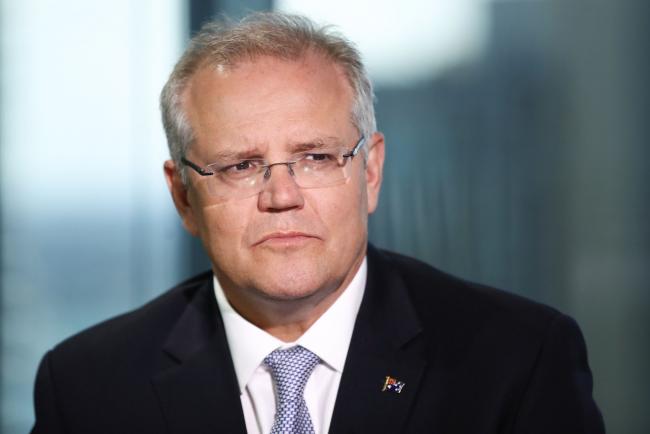(Bloomberg) -- Australia is urging Indo-Pacific nations to step up their commitment to free trade as the worsening fallout from the U.S.-China impasse threatens global growth.
“It is in no-one’s interest in the Indo-Pacific to see an inevitably more competitive U.S.-China relationship become adversarial in character,” Prime Minister Scott Morrison will say in a speech Wednesday to an event hosted by Asialink and Bloomberg.
He warned that countries may need to adjust to the decoupling of U.S. and Chinese economic systems in areas such as technology, payments systems and financial services. “We should not just sit back and passively await our fate in the wake of a major power contest,” Morrison plans to say, according to a copy of the speech distributed to reporters.
Morrison’s appeal comes as world leaders prepare to gather at the Group of 20 summit in Osaka this weekend. President Donald Trump and China’s Xi Jinping are set to meet on the sidelines for a high-stakes discussion that could determine whether their year-long trade war escalates further, potentially altering global supply chains.
Australia is vulnerable to worsening ties between the U.S., its most important strategic ally, and China, its biggest trading partner. It also sits in the heart of a region where the world’s two biggest economies are sparring for influence.
In his first foreign-policy speech since his conservative government was re-elected last month, Morrison will say Indo-Pacific nations can take practical measures to counter the trade war, including “a commitment to open markets with trade relationships based on rules, not coercion” and respect for international law.
He’s backing multilateral trading agreements including the 11-member Trans Pacific Partnership and the China-backed Regional Comprehensive Economic Partnership. The latter could be completed this year, with the help of potential participants sending their trade ministers to a meeting next month in Beijing “with a clear mandate to deal,” he said.
Morrison is under no illusions about the damage posed by the trade war.
“The collateral damage is spreading,” Morrison said in the speech notes. “The global trading system is under real pressure. Global growth projections are being wound back.”
Trump has threatened to impose tariffs on a further $300 billion in Chinese products including smartphones, laptops and children’s clothing if he doesn’t see meaningful Chinese economic reforms. In a briefing call Monday, U.S. officials said the president was focused above all on securing real structural reforms in China to address U.S. complaints about intellectual property theft and the widespread use of industrial subsidies among other things.
“The U.S. believes that the rule-based trading system in its current form is not capable of dealing with China’s economic structure and policy practices.” Morrison said. “Many of these concerns are legitimate,” including complaints about forced technology transfers, intellectual property theft and industrial subsidies that promote over-production.
“We will work with the U.S. to reform international institutions, including the WTO, to ensure they’re fit for purpose,” he said.
Morrison said China has reached a “threshold level of economic maturity,” especially in its major economic centers, yet is still allowed to compete with trade and environmental concessions not available to other developed nations.
In the speech, Morrison lauds both the U.S. and China, treading a fine line taken by successive Australian leaders who’ve insisted they don’t have to choose between the two superpowers.
Nevertheless, relations with China have been strained since Australia last year passed laws aimed at reducing Chinese meddling in national affairs and barred Huawei Technologies Co. from helping build its 5G network.
Those moves irked the government in Beijing. Chinese ports have delayed imports of Australian coal, while the Global Times, a mouthpiece for the Communist Party of China, said the re-election of Morrison’s government will “continue current poor relations.”
“The decisions we make in relation to China are based solely on our national interests, just as theirs are towards Australia, and these are sometimes hard calls to make,” Morrison said. “But they are designed always to leave large scope for cooperation on common interests and recognize the importance of China’s economic success.”
The strained relationship has taken its toll on Australians’ trust in China, according to a survey released Wednesday.
Australians Trust China Less Even as Their Dependence Grows
The number of Australians who say they trust China to act responsibly has fallen to 32% this year from 52% in 2018, according to the annual survey conducted by Sydney-based think tank the Lowy Institute. It also showed that 74% believe Australia is too economically dependent on China.
In the wide-ranging speech, Morrison said Australia backs Japanese Prime Minister Shinzo Abe’s “vision to strengthen the international order,” which will be demonstrated at the G-20 meeting. He said the alliance with the U.S. “is the bedrock of Australia’s security, providing us with irreplaceable hard power capabilities and intelligence.”
Australia will remain committed to “step up” in its engagement with the Pacific Islands region, Morrison said.
(Updates with Lowy Institute survey results.)
